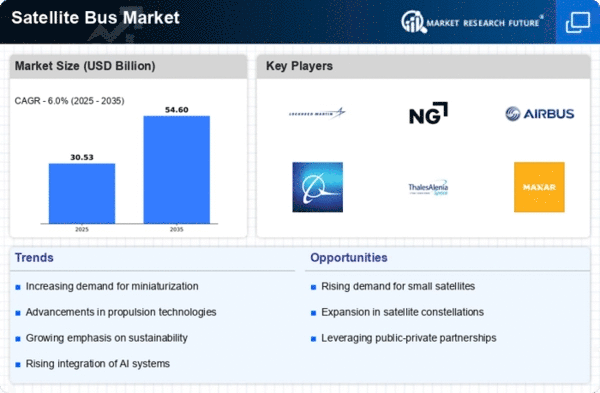Market Trends
Key Emerging Trends in the Satellite Bus Market
In recent years, the aviation industry has undergone significant changes in safety protocols, prompted by major accidents that have reshaped the parameters for ensuring aircraft safety. Notable incidents include the crash of Air France Flight 447 in June 2009, the mysterious disappearance of Malaysia Airlines Flight 370 in March 2014, and the tragic crash involving Indonesia AirAsia Flight QZ8501 in December 2014. These incidents have underscored the critical need for robust safety measures and enhanced capabilities to track and retrieve flight data, leading to the development and implementation of advanced flight tracking systems.
The primary purpose of a flight tracking system is to address the safety challenges inherent in aircraft operations and provide a mechanism for efficiently retrieving crucial flight data. The goal is to enhance overall safety in the aviation sector, offering a proactive approach to monitoring and managing flights in real-time.
Simultaneously, the market for flight tracking systems is being driven by the escalating emphasis on safety standards and regulatory norms set by government bodies. The commercial aircraft industry, in particular, is undergoing advancements to adhere to these stringent safety regulations. Recognizing the imperative to elevate safety measures, Airbus, a major player in the aerospace industry, announced in 2017 its commitment to implementing a flight tracking system on its A350 and A380 aircraft. This proactive step aligns with the evolving government standards and reflects the industry's dedication to adopting cutting-edge technologies that enhance aviation safety.
The implementation of flight tracking systems is expected to be instrumental in addressing safety concerns by providing real-time monitoring and data retrieval capabilities. These systems offer a comprehensive solution to the challenges posed by unexpected incidents, ensuring a swift response and accurate assessment of critical situations. As a result, the demand for flight tracking systems is on the rise, driven by the aviation industry's collective commitment to achieving the highest levels of safety.
Furthermore, the increasing need for a heightened level of safety in aviation is a key factor propelling the demand for flight tracking systems. The aviation sector is inherently risk-sensitive, and the integration of advanced tracking technologies is regarded as a crucial step towards minimizing risks and ensuring the well-being of passengers and crew members. The growing awareness of safety imperatives, both within the industry and among the general public, is fostering a conducive environment for the adoption of innovative solutions like flight tracking systems.



















Leave a Comment